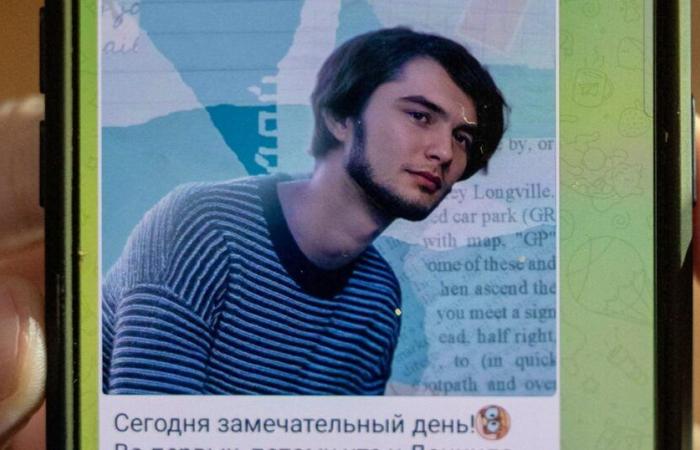He scribbled drawings mocking the Kremlin. Daniil Kliouka has since been thrown into the depths of the Russian prison system for many years, where violence imposes its silence and where traces of prisoners sometimes disappear.
AFP
His story is just one example among many in Russia, in the midst of repression of any resistance, real or imagined, to the invasion of Ukraine.
Until the winter of 2023, this 28-year-old Russian plastic arts teacher led a peaceful existence in Dankov, a town located 300 kilometers south of Moscow, not far from the station where the writer Leo Tolstoy died.
On the website of his old school, an ordinary establishment, you can see photographs of his classroom with reproductions of paintings on the walls, including a self-portrait by Van Gogh.
Letter exchange
His life collapsed in February 2023 when he was arrested in Dankov by hooded agents of the FSB, the formidable Russian security services. They accuse him of having sent 135,000 rubles (around 1,213 francs at the current rate) in digital currency to the Ukrainian ultranationalist Azov brigade, classified as “terrorist” in Russia. Accusations he denies.
Daniil Kliouka says it all started when his director reported him to the FSB for sketching little anti-power drawings on a newspaper. The AFP was able to reconstruct his descent into hell after learning the content of letters he exchanged with a Russian anti-war activist living in exile in Italy.
Antonina Polichtchouk, 43, gradually brought this affair out of the shadows from August 2023, thanks to a project encouraging epistolary relations with political prisoners who, even prosecuted for the most serious crimes, have a right of correspondence .
Originally, she chose to talk with Daniil Kliouka, because he wanted to talk about architecture and Japanese cartoons. “I am interested in architecture and my daughter is interested in Japanese cartoons. I said to myself that we could write to him together,” explains Ms. Polichtchouk.
Drawings of “mustaches”
Through letters exchanged via the official online platform of the prison administration, she discovered that the young man was being prosecuted for “high treason” and “financing a terrorist organization”. These crimes, punished very severely, are regularly used by the Russian state to crush protesters.
Daniil Kliouka claims to have been the victim of a denunciation. This process is popular in Russia and encouraged by the authorities, like Russian President Vladimir Putin who, as early as March 2022, called for the removal of “traitors” and the “self-purification” of society.
Daniil Kliouka said that in his spare time, at his workplace, he drew “horns, beards and mustaches” on photographs in a local pro-Kremlin newspaper. “When there were representatives of power on a page, I sometimes wrote ‘demon’ on their foreheads,” he said in a letter published by the Telegram group Politzek-Info, covering political repressions.
But one day he forgot the newspaper at school and his colleagues came across it. According to him, for these scribbles, his director fired him and contacted the FSB. He said he was then arrested, tortured “in a cellar” and that his home was searched.
20 years in a camp
It was in his phone confiscated at his home that the agents found the evidence, according to them, of the suspicious transfers. Daniil Kliouka claims to have made a false confession and admitted under the blows to having sent funds to the Azov brigade, before declaring in his letters, once in detention, that he had in fact transmitted money to a Ukrainian cousin.
The cousin, Mykyta Laptiev, confirmed having received this money and assures that it was used to treat his father, Daniil Kliouka’s uncle. Contacted on social networks, the school manager whom the teacher accuses, Irina Kouzitcheva, did not respond to requests from AFP.
It is also impossible to compare the prisoner’s statements with those of the prosecution because the FSB classified the procedure as secret, as almost always in this type of case. His defense is prohibited from discussing the case, under penalty of prison.
After six months of correspondence, activist Antonina Polichchouk realized that Daniil Kliouka only had a court-appointed lawyer who, “de facto, works for the government.” “His family could have paid a lawyer and taken care of it, but their situation is complicated, they were intimidated. The FSB scares everyone,” she laments.
Daniil Kliouka was sentenced on appeal to 20 years in prison to be served under “severe regime”, that is to say in particularly strict conditions of detention. Each year, he will only be allowed one visit and one package.
ATS






